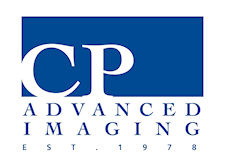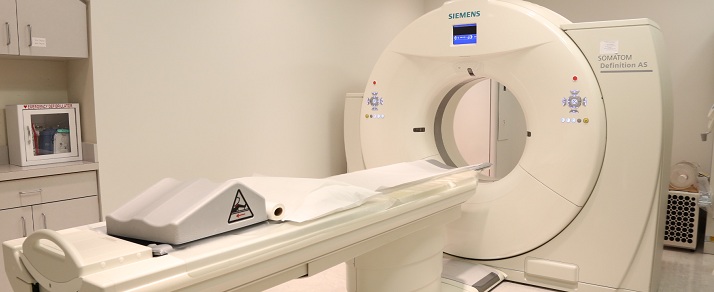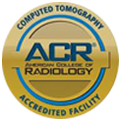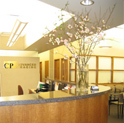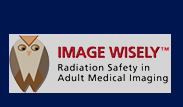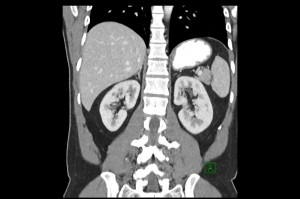 A Computed Tomography or CT scan is an imaging test that combines computers and 360-degree x-rays to produce highly detailed images of the body. CT scans are one of the best tools to look for sources of pain in the abdomen or pelvis, to find the causes of breathing difficulty, to show the extent of cancers, or to demonstrate problems of the skeleton. We often perform CTs to examine lung nodules, liver masses, and to follow stones in the kidneys and bladder. Some of the most sophisticated uses of CT include examination of the heart, the blood vessels, and to look at the inside of the colon for cancer.
A Computed Tomography or CT scan is an imaging test that combines computers and 360-degree x-rays to produce highly detailed images of the body. CT scans are one of the best tools to look for sources of pain in the abdomen or pelvis, to find the causes of breathing difficulty, to show the extent of cancers, or to demonstrate problems of the skeleton. We often perform CTs to examine lung nodules, liver masses, and to follow stones in the kidneys and bladder. Some of the most sophisticated uses of CT include examination of the heart, the blood vessels, and to look at the inside of the colon for cancer.
CP Advanced Imaging is committed to delivering the best possible care and providing excellent image quality while using the lowest possible level of radiation. Through our equipment and expertise, your exam will be performed with advanced radiation reduction technology and optimized protocols . This will maximize results while minimizing radiation dose.
Equipment: Our CT and PET/CT units feature advanced radiation dosage reduction technology including SAFIRE which has been shown to decrease radiation by 60%.
Expertise: Our physicians have developed protocols which are tailored to evaluate the area of interest. The protocols meet national benchmarks and are well below the radiation dosage thresholds.
We are committed to delivering the best possible care at the lowest radiation dose possible.
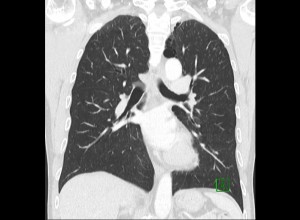 For the intravenous contrast studies, do not eat 4 hours prior to the exam. You should wear loose, comfortable clothing, avoiding garments that have zippers, belts, or buttons made of metal.
For the intravenous contrast studies, do not eat 4 hours prior to the exam. You should wear loose, comfortable clothing, avoiding garments that have zippers, belts, or buttons made of metal.
You may be asked to wear a gown during the procedure. You will be asked to remove keys and jewelry from the area being scanned.
Women should always inform their physicians and the technologist if there is any possibility of pregnancy.
If you are having a CT scan of the abdomen or pelvis, you may be asked to drink several cups of liquid contrast for up to two hours. The technologist will then comfortably position you on an exam table which will pass slowly through the CT scanner. Some CT examinations may require you to receive an injection of contrast dye into the bloodstream. Depending on the type of exam, the portion requiring intravenous contrast injection usually lasts only 10 to 30 seconds while the entire scan time is usually completed in minutes.
(212) 219 - 9135
